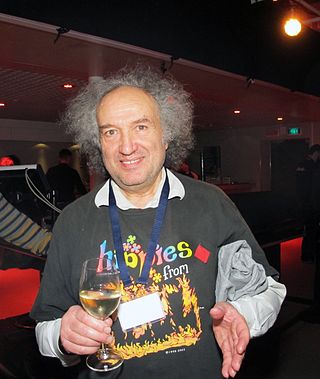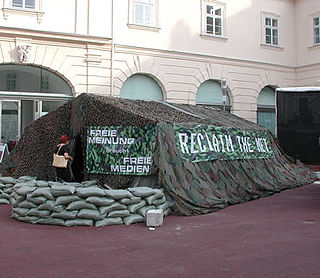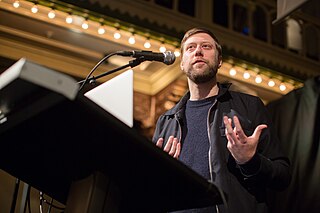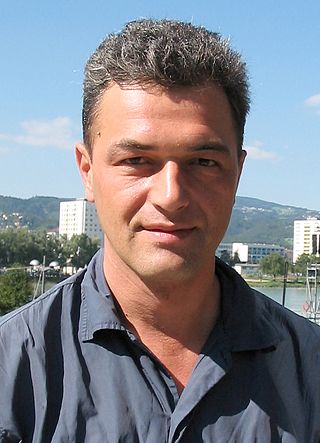net.art refers to a group of artists who have worked in the medium of Internet art since 1994. Some of the early adopters and main members of this movement include Vuk Ćosić, Jodi.org, Alexei Shulgin, Olia Lialina, Heath Bunting, Daniel García Andújar, and Rachel Baker. Although this group was formed as a parody of avant garde movements by writers such as Tilman Baumgärtel, Josephine Bosma, Hans Dieter Huber and Pit Schultz, their individual works have little in common.
mezangelle is a poetic-artistic language developed in the 1990s by Australian-based Internet artist Mez Breeze. It is recognized as a central contribution to Codework, Electronic literature, Internet Art and digital writing in general.
Tactical media is a term coined in 1996, to denote a form of media activism that privileges temporary interventions in the media sphere over the creation of permanent and alternative media outlets.
Eyebeam is a not-for-profit art and technology center in New York City, founded by John Seward Johnson III with co-founders David S. Johnson and Roderic R. Richardson.

Patrice Riemens is a geographer and currently the Fellow of the Waag Society in Amsterdam. He is a promoter of Open Knowledge and Free Software, and has been involved as a "FLOSSopher" at the Asia Source and Africa Source camps, held in 2005 and 2006 to promote FLOSS among non-governmental organisations. He is a member of the staff of Multitudes.

Public Netbase was a cultural media initiative, open access internet platform, media art space, and advocate for the development of electronic art.
"The Californian Ideology" is a 1995 essay by English media theorists Richard Barbrook and Andy Cameron of the University of Westminster. Barbrook describes it as a "critique of dotcom neoliberalism". In the essay, Barbrook and Cameron argue that the rise of networking technologies in Silicon Valley in the 1990s was linked to American neoliberalism and a paradoxical hybridization of beliefs from the political left and right in the form of hopeful technological determinism.

Nettime is an internet mailing list proposed in 1995 by Geert Lovink and Pit Schultz at the second meeting of the "Medien Zentral Kommittee" during the Venice Biennale. Since 1998, Ted Byfield and Felix Stalder have moderated the main list, coordinated moderation of other lists in the nettime "family," and maintained the site as their nexus.
Mark Stephen Meadows (born September 28, 1968) is an American author, inventor, artist and researcher at NASA Convergent Aeronautics Solutions.

Fran Ilich Morales Muñoz is a Mexican writer and media artist who principally works on the theory and practice of narrative media. Since 2010 Ilich lives in New York City.
Jussi Ville Tuomas Parikka is a Finnish new media theorist and Professor in Digital Aesthetics and Culture at Aarhus University, Denmark. He is also (visiting) Professor in Technological Culture & Aesthetics at Winchester School of Art as well as Visiting Professor at FAMU at the Academy of Performing Arts in Prague. In Finland, he is Docent of digital culture theory at the University of Turku. Until May 2011 Parikka was the Director of the Cultures of the Digital Economy (CoDE) research institute at Anglia Ruskin University and the founding Co-Director of the Anglia Research Centre for Digital Culture. With Ryan Bishop, he also founded the Archaeologies of Media and Technology research unit.

Googlization is a neologism that describes the expansion of Google's search technologies and aesthetics into more markets, web applications, and contexts, including traditional institutions such as the library. The rapid rise of search media, particularly Google, is part of new media history and draws attention to issues of access and to relationships between commercial interests and media.

Makmende is a fictional Kenyan superhero character which has enjoyed a popular resurgence after an adaptation by Kenya's musical group Just a Band in the music video for their song Ha-He on their second album, 82 (2009). The video became the first viral internet sensation originating from Kenya.

HJ Grievink is a Dutch graphic designer and editor based in Amsterdam. He works on a range of commissioned and self-initiated projects positioned at the intersection of graphic design and visual culture research. Grievink is best known for designing and co-editing the book Next Nature: Nature Changes Along With Us, and for developing the memory games, Fake for Real and Brand Memory.

Nathaniel Tkacz is a Swedish-Australian scholar of digital media who is currently Reader at the University of Warwick. His research on Wikipedia has been influential in media studies and organisational theory. Tkacz has described his work as investigating "the political, economic and organisational dimensions of technology, with a specific focus on networked and digital forms".
Alessandro Ludovico is a researcher, artist and chief editor of Neural magazine since 1993. He received his Ph.D. degree in English and Media from Anglia Ruskin University in Cambridge (UK). He is Associate Professor at the Winchester School of Art, University of Southampton and Lecturer at Parsons Paris – The New School. He has published and edited several books, and has lectured worldwide. He also served as an advisor for the Documenta 12 Magazine Project. He is one of the authors of the award-winning Hacking Monopolism trilogy of artworks.

Armin Medosch (1962–2017) was an Austrian artist, curator, theorist and critic working in the fields of net.art, new media art and DiY networking.
Tjebbe van Tijen is a sculptor, performance artist, curator, net artist, archivist, documentalist and media theorist who lives and works in Amsterdam. He is best known for his 1960s collaborative public performances, and for his later artworks and projects done in collaboration with archives and libraries.
Ana Peraica is a Croatian-born photography theorist and Ghetto activist, whose work is focused on post-digital photography. Born to a family of professional photographers, her grandfather Antonio Peraica was a war reporter and filmmaker and her father a photographer of architecture. Peraica is focused on constant changes of the medium, bringing focus to its rational, scientific implementations, but also irrational horrors.









